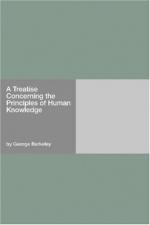Title: A Treatise Concerning the Principles of Human Knowledge
Author: George Berkeley
Release Date: December, 2003 [Etext #4723] [Yes, we are more than one year ahead of schedule] [This file was first posted on March 7, 2002]
Edition: 10
Language: English
Character set encoding: ASCII
The Project Gutenberg Etext of A Treatise Concerning the Principles of Human Knowledge by George Berkeley This file should be named prhkn10.txt or prhkn10.zip
Corrected editions of our etexts get a new number,
prhkn11.txt
versions based on separate sources get new letter,
prhkn10a.txt
Prepared by Col Choat colc@gutenberg.net.au
Project Gutenberg Etexts are often created from several printed editions, all of which are confirmed as Public Domain in the us unless a copyright notice is included. Thus, we usually do not keep etexts in compliance with any particular paper edition.
The “legal small print” and other information about this book may now be found at the end of this file. Please read this important information, as it gives you specific rights and tells you about restrictions in how the file may be used.
A Treatise Concerning the Principles of Human Knowledge by George Berkeley (1685-1753)
Wherein the chief causes of error and difficulty in the sciences, with the grounds of scepticism, atheism, and irreligion, are inquired into.
DEDICATION
To the Right Honourable
Thomas, Earl of Pembroke, &C.,
Knight of the most Noble Order of the Garter and one
of
the Lords of Her Majesty’s most honourable privy
council.
My Lord,
You will perhaps wonder that an obscure person, who has not the honour to be known to your lordship, should presume to address you in this manner. But that a man who has written something with a design to promote Useful Knowledge and Religion in the world should make choice of your lordship for his patron, will not be thought strange by any one that is not altogether unacquainted with the present state of the church and learning, and consequently ignorant how great an ornament and support you are to both. Yet, nothing could have induced me to make you this present of my poor endeavours, were I not encouraged by that candour and native goodness which is so bright a part in your lordship’s character. I might add, my lord, that the extraordinary favour and bounty you have been pleased to show towards our Society gave me hopes you would not be unwilling to countenance the studies of one of its members. These considerations determined me to lay this treatise at your lordship’s feet, and the rather because I was ambitious to have it known that I am with the truest and most profound respect, on account of that learning and virtue which the world so justly admires in your lordship, my lord, Your lordship’s most humble and most devoted servant,




